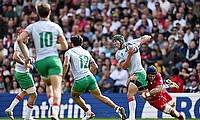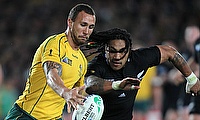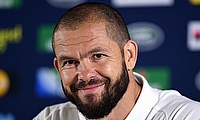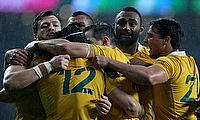'We’re 30 years behind, but we’re on our way' - Martín Sigren on a historic five years for Chile with a World Cup now on the horizon
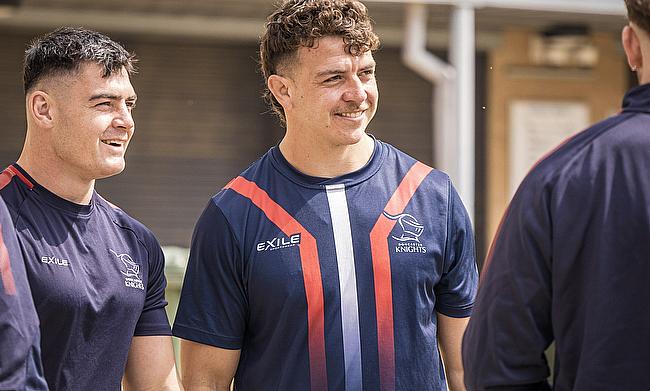
Martin Sigren, who was on the books at Doncaster Knights last season, is looking forward to representing Chile at their first-ever World Cup
©John Ashton
In 2018, Martín Sigren was earning his first caps under current Chile head coach Pablo Lemoine as the Maori All Blacks hammered Los Cóndores 73-0 in a sold-out San Carlos de Apoquindo, a definitive loss in the biggest game in their history.
Fast forward to 2023 and Chile will be taking on Argentina, England, Japan and Samoa when they compete in their first-ever Rugby World Cup later this year having knocked out RWC stalwarts Canada and USA in the process.
So how have Sigren and Chile turned things around so dramatically?
Reflecting on the start of his international career - the Maori All Blacks match - the humble backrower admits the fixture was never really about the rugby.
"It was a huge show," Sigren says. "It was a commercial event which helped the Federation to earn money. They sold lots of tickets, filled the stadium and raised a huge crowd and ultimately it was a spectacle.
"It wasn’t ‘come and see Chile!' It was ‘come and see the All Blacks, players at the highest level, against our brave little Chileans!'
"It was a commercial event to raise cash, generate resources and to make the news and media. As you can see, in a rugby sense, it didn’t do anything for us as a group. Pablo (Lemoine) had just arrived, we were a new group with one month together. If anything, it was a test for Pablo to see what his players were made of. Ultimately it was a success because the goals were not rugby goals."
Having first tasted professionalism in the Superliga Americana de Rugby (now called Super Rugby Americas) in his native Chile, the powerful backrower was most recently playing for Championship side Doncaster Knights before being released at the end of the 2022-23 season: "I came with the aim of improving my rugby, but also of challenging myself off the field and living there alone," he says.
"The truth is I have enjoyed it and achieved more than I had hoped. The league is really competitive and demanding, not just in the matches but also the training.
"It’s a step up in the sense that it’s a higher tempo, it's more physical, the players are bigger and there are more competitive fixtures.
"In the Championship, any team that’s mentally prepared can compete, can ask questions of you. At Selknam (Sigren's former side in Chile) we had Cobras (Brazil’s franchise) who were a bit below our level, Cafeteros (Colombia’s former franchise) too, so we had some really competitive games but others not so much. It was also quite short; 10 games against about 25 in the Championship."
With English rugby's second tier developing Sigren’s career and taking him to new levels, he remains humble and wants to keep developing his game.
"If I couldn’t stay here [in England], ProD2 would be good. I dream of making it to the top level, but I have a grounding in that although I’m not miles away, I’m not yet ready to compete at that level.
"It would be a huge leap to make it there. I feel a responsibility to show that Chileans are good enough to compete in these leagues at this level.
"The World Cup is a chance to show we can compete at that level and validate ourselves, to show we can compete in challenging competitions."
Looking to the future, despite the huge benefits reaped from playing together in Super Rugby Americas (the majority of Chile's internationals play for Selknam), Sígren believes more of his Cóndores can flee their Andean nest.
“To a certain degree, everyone being based in Chile has helped us. We didn’t have long to prepare ourselves. We had three years together in which we got to know each other, to develop our systems and to play together, create a bond, a purpose and to really find the essence of the group and to qualify for the World Cup.
"We’ve now got to the point where being spread out would benefit us. I think all teams have players in different teams and leagues. Learning new systems, playing with other people, all of these things enrich you as a player and help you to be at your best.
"In Chile, once I more or less secured my place, I lacked that competition to challenge me every day, and this is something you can gain being abroad."
Certainly, the World Cup in France is the perfect shop front for Chile and will represent a huge opportunity, not only as a nation, but as individuals. In particular, Sigren relishes the chance to take on Chile’s natural foes, who happen to also be their rugby heroes: The Argentinians.
“The game we have the best shot at in terms of being competitive? Samoa," he adds. "The game which excited me most is the Pumas, a team which since being a child we watched at World Cups. They’re our neighbours. I’m a fan of the Pumas.
"My grandmother on my father’s side is Argentinian, she infected me with a desire to see them, to go to Mendoza to follow them. It’s like the heroes of your whole life have become your rivals. It’s a special game for us all.
"Chileans are Argentinian rugby fanatics. When they play in Argentina, many Chileans travel there. Ultimately, it's admiration for our neighbours and for their incredible rugby culture. They lead the region.
"Thanks to them, Sudamérica Rugby [governing body for rugby union within South America and most of Central America] has resources. If they can do it, we can do it too.
"We’re 30 years behind, but we’re on our way. More than an issue of infrastructure, it’s culture. The culture that people know about the sport, that it’s played in more schools, that clubs have a bigger role in developing players.
"We don’t develop coaches, referees, all the structures that are currently growing but I think Sudamérica Rugby is doing a good job with that now. It’s the first time we’ve had three South American teams at a World Cup, which is huge."
Sigren asks where Chile can be in 30 years, naturally comparing his country to Argentina. There are huge differences between the Andean nations and the future is by no means certain, but if this is a 30-year project, the first five years have been spectacular.
This article is a result of an interview conducted and translated by the author.



